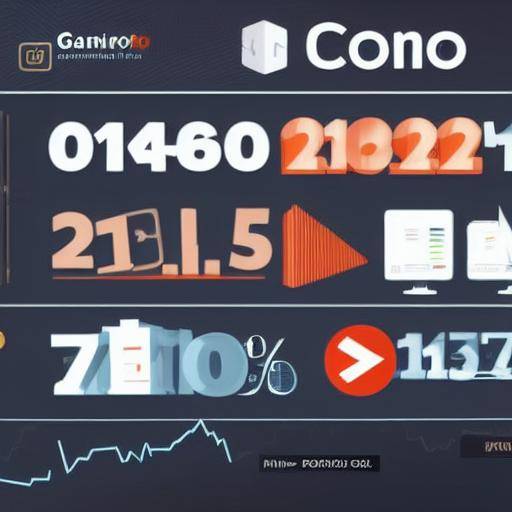
Indexed funds have become a popular option for investors seeking long-term profitability, low costs and patience as an ally. In this article, we will thoroughly explore these key issues and provide an integral insight into how indexed funds can be a powerful tool to build wealth sustainably over time.
Introduction
Long-term investment is a strategy that seeks to achieve positive performance on a broad time horizon, generally beyond five years. In this context, indexed funds have gained popularity due to their focus on diversification, low costs and a passive investment strategy that seeks to replicate a specific market index.
History and Background
To understand the current relevance of indexed funds, it is crucial to know their origin and development over time. The first indexed funds emerged in the 1970s, leading a revolution in the way investments were made. Their focus on following a specific index, rather than trying to overcome the market, marked a fundamental change in the investment mentality.
As indexed funds gained acceptance, their popularity quickly grew among institutional and retail investors. This increase in demand has led to a significant expansion in the availability of indexed fund options throughout different asset classes, from stocks to bonds and raw materials.
Analysis in Deep
Indexed funds offer a number of benefits for long-term investors. In addition to providing instant diversification through multiple assets, these funds tend to have significantly lower costs compared to actively managed funds. This results in greater potential profitability over time, as high management costs can reduce the net return of investors.
In addition, the passive strategy of indexed funds fosters patience as a virtue for investors. By maintaining long-term positions, investors can avoid pressure to make impulsive decisions based on short-term market movements, which can lead to greater emotional stability and more consistent financial results.
Comprehensive review
In considering profitability, low costs and patience as fundamental pillars of long-term investment, it is essential to analyze how indexed funds align with these factors. In practice, historically indexed funds have shown a competitive profitability, especially considering their low cost structure. The combination of both features has led to a greater attraction of investors towards this long-term form of investment.
Although patience can be challenging in an investment environment characterized by volatility and uncertainty, indexed funds foster a peaceful and long-term approach. By avoiding impulsive emotions and market noise-based decisions, investors can benefit from long-term trends and mitigate the risks associated with short-term volatility.
Comparative analysis
By comparing key factors of profitability, low costs and patience, indexed funds stand out as an attractive option for long-term investments. In contrast to actively managed funds, which often struggle to consistently overcome market performance after costs, indexed funds offer a more predictable and cost-effective solution.
Furthermore, the need for patience is supported by the very strategy of indexed funds, which is based on maintaining a constant exposure to markets rather than attempting to chronomerate specific movement. This combination of factors makes indexed funds an attractive option for investors looking for a solid long-term growth strategy.
Practical Tips and Accessible Tips
In considering long-term investment through indexed funds, it is important to take into account some practical tips. These include the importance of financial discipline, diversification through different asset classes, regular portfolio review and maintenance of realistic long-term expectations. This can help investors maintain a balanced and informed approach to their investment decisions.
Industry Perspectives and Expert Reviews
In analyzing current trends, experts often support the idea that indexed funds represent a solid option for long-term investments. Their emphasis on diversification and low costs has been recognized as a rational and efficient approach to maximizing long-term performance. In addition, the demand for indexed funds is expected to continue to grow as more investors recognize the intrinsic benefits of this investment strategy.
Case Studies and Practical Applications
To illustrate the effectiveness of the funds indexed in the context of long-term investments, specific case studies can be presented. These can demonstrate how the combination of profitability, low costs and patience has generated solid results for investors over time, providing a practical and applicable view to the discussion.
Future Trends and Predictions
Looking forward, trends suggest that indexed funds will continue to play a significant role in the long-term investment landscape. As investors seek to maximize their returns while minimizing costs, the inherent benefits of this strategy will remain attractive. In addition, technological developments and increased financial education are expected to lead to greater adoption of the funds indexed in the coming years.
Conclusions and FAQs
In short, indexed funds offer an attractive way for investors seeking to maximize long-term profitability, minimize costs and maintain patience as an ally. Through their approach to diversification, low costs and passive investment strategy, these funds provide a holistic solution for long-term financial goals.
Frequently asked questions
What is profitability in the context of indexed funds?
The profitability in the context of indexed funds refers to the performance that investors can obtain over time by following a specific market index. This performance is influenced by factors such as the composition of the index, the evolution of markets and the passive management of the fund.
How do low costs contribute to the profitability of indexed funds?
The low cost of indexed funds allows for maximizing net profitability for investors, as a lower charge of expenses allows a higher percentage of generated returns to be maintained in the accounts of investors.
Why patience is important when investing in long-term indexed funds?
Patience is crucial when investing in long-term indexed funds, as it allows investors to maintain positions despite short-term volatility, avoiding impulsive decisions that could adversely affect long-term performance.
What are the risks associated with indexed funds?
Although indexed funds offer a sound investment strategy, there are potential risks, such as market volatility and the risk of capital loss. It is important that investors be aware of these risks and make informed decisions.
What are some practical tips for investing in long-term indexed funds?
Some practical tips include maintaining a long-term vision, diversifying the portfolio, periodically reviewing asset distribution and maintaining realistic expectations.
What is the role of the funds indexed in a long-term investment environment?
Indexed funds play a key role in providing investors with a diversified and cost-effective solution for their long-term goals. Their focus on replicating specific indexes through a passive strategy makes them attractive to those who seek to maximize their profitability with prudent and predictable management.
In short, indexed funds offer a solid and balanced approach to long-term investments by prioritizing profitability, minimizing costs and promoting patience as an essential tool. By understanding and implementing these principles in the context of a long-term investment strategy, investors can build a solid path to sustainable financial growth.
Conclusion
In conclusion, it is important to note that indexed funds represent a robust tool for investors who want to gain long-term profitability, while minimizing costs and maintaining a patient mentality. Their focus on diversification, low costs and a passive strategy makes them especially suitable for those seeking to build wealth in a sustainable manner.
FAQs
- **How do the funds indexed in the stock market work?**Indexed funds operate by replicating a specific market index, which means they invest in all shares or bonds that make up that index. In doing so, they offer investors a diversified exposure to overall market performance.
- **What is the difference between indexed funds and traditional mutual funds?**The main difference lies in the investment strategy. Indexed funds seek to replicate a specific index with a passive strategy, while traditional mutual funds are managed actively, with the aim of overcoming market performance.
- **What is the importance of diversification in indexed funds?**Diversification is essential in indexed funds, as when replicating an index, they are exposed to a wide range of assets, which helps mitigate the specific risk of each individual asset and promotes greater stability in the portfolio.
- **Why are low costs a key feature of indexed funds?**Low costs are important because every dollar that is saved in management costs is translated directly into greater profitability for investors. By minimizing these costs, indexed funds can maximize net performance for their shareholders.
- **How much patience is needed when investing in long-term indexed funds?**Patience is fundamental in investing in long-term indexed funds, as it allows investors to keep calm in volatility periods and avoid impulsive decisions that may harm long-term performance. It is important to maintain a long-term perspective and not react to short-term market fluctuations.
- **What kind of investor benefits more from long-term indexed funds?**Indexed funds are particularly attractive for investors seeking a passive investment strategy, based on diversification and low costs, with a long-term growth-oriented mentality. This approach is suitable for both beginner and experienced investors who seek a stable and sustainable strategy for their long-term financial goals.
With these knowledge and best practices, investors can make the most of the funds indexed as a powerful tool for their long-term investments, maximizing profitability, minimizing costs and cultivating a patient and sustainable growth-focused mentality.










